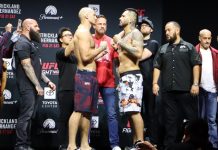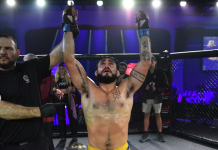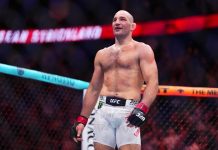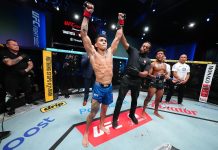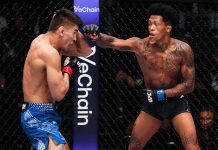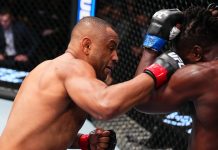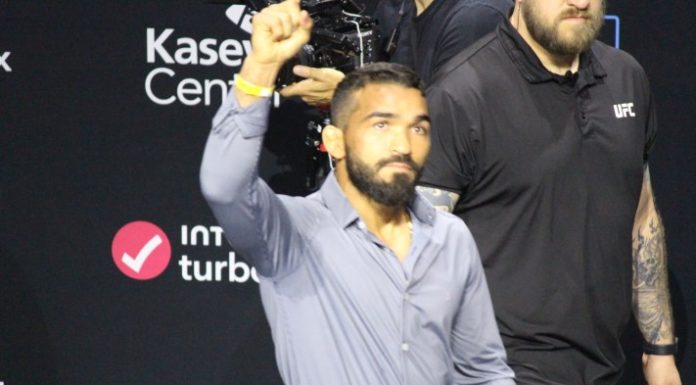There’s no sugar-coating it: Abdul Razak Alhassan has not fought in the UFC since September of 2018 because he was on trial for sexual assault.
The welterweight was 4-1 in the promotion, with three straight wins via stoppage, when his life fell apart. Actually, it started a little before that: the incident in question took place in March 2018. Two women accused Alhassan of raping them, following a night of drinking at a bar in Forth Worth, Texas, where Alhassan worked as a bouncer.
That September, while on bail, Alhassan knocked out Niko Price at UFC 228. Weeks later, he was indicted on two counts of sexual assault.
In March of this year, however, Alhassan was found not guilty in a jury trial. The fighter pointed his finger at police — literally at one point — suggesting they had failed to examine evidence of his innocence. That included failing to check his cell phone for exculpatory evidence. While his DNA was found in the victims, he claimed the sex had been consensual.
The jury sided with Alhassan in the end. Clearing the way for his career to resume. Something he had doubts over. In a frank answer to Cageside Press at Monday’s UFC Fight Island 1 virtual media day, the fighter admitted that he had doubts about life itself at points.
“So many times,” he said about doubting if he’d ever fight again. “I even doubted if I’d be alive, because I wanted to kill myself.”
“People don’t see what happens in the background. A lot of people will doubt you, will say bad stuff about you when they don’t know the truth. This is the type of harassment you don’t wish on anybody,” he continued.
So yes, Alhassan said, he considered killing himself. “I sat down and thought about it.” What stopped him was his children. “I have two kids, I have a girl and I have a boy. What would happen to them if I killed myself because of some evil people trying to ruin me?”
That statement is likely to enrage some. Victim blaming entered the lexicon years ago. Alhassan has always maintained his innocence, however. And due process played out in this case, he noted. “I proved my innocence. I proved to them that they will never amount to anything. And God will always prevail and show the truth. But I learned so much from it. Everything happens for a reason.”
And while on one hand, Alhassan said “I feel like it made me stronger than I was before,” it’s also something that “I would never wish even on my worst enemy.”
Even more so today than in 2018, social media has taken over as judge, jury and executioner whenever any public figure is accused of, well, anything. It no doubt played a role in the downfall of Bill Cosby and Harvey Weinstein.
Alhassan is certainly aware of what the response to his inclusion on this week’s card in Abu Dhabi will be like. But he’s tuned out his critics. “I don’t really care what they say. I don’t really care much about what they say at all. I never got any message from anybody that has said some bad things about me.”
While he knows that is out there, the messages he has received from followers have been positive, Alhassan said. Saying “they were praying for me, and God will prevail.”
“I never worried about what anybody else [said] as long as I knew. And I know I’m a good person. And I know I would never do something like that. I would choose death over doing something like that. So I don’t really care about what they say,” he stated.
In the end, Alhassan said any pushback online is no more than the usual social media hate, that makes up so much of today’s internet platforms. “It’s like the fighting world. It doesn’t matter what you do. There’s gonna be some people sitting at a computer, who you don’t know, they’ll say whatever they have to say. If you listen to them, you’re pretty much gonna downplay yourself, pretty much worry yourself for nothing. If you don’t have anything positive to say to me, I’m not listening to you.”
Whether or not Alhassan is listening, it’s likely MMA fans will be watching, and having their say come UFC on ESPN 13 on Wednesday, when he takes on promotional newcomer Mounir Lazzez.




